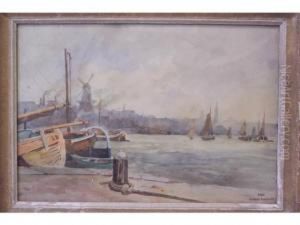Pierre Waldeck Rousseau Paintings
Pierre Marie René Ernest Waldeck-Rousseau was not an artist but a prominent French statesman who served as the Prime Minister of France from 1899 to 1902. Born on December 2, 1846, in Nantes, France, he pursued a career in law and politics rather than the arts. His father, René Waldeck-Rousseau, was also a politically active lawyer who had a significant influence on Pierre's early life and career.
After completing his law studies, Waldeck-Rousseau quickly made a name for himself as a capable lawyer. He was an ardent defender of the French Republic and got involved in politics, becoming a member of the National Assembly. Throughout his political career, Waldeck-Rousseau was associated with the moderate left. He held various governmental positions before being elected to the Senate in 1883.
As a politician, his most notable contribution was his tenure as Prime Minister. During this time, he formed the 'government of Republican Defense' which aimed at consolidating the Third Republic and the principles of laïcité, or secularism, in the face of the Dreyfus Affair—the political scandal that divided France over the wrongful conviction of Jewish army officer Alfred Dreyfus for treason. Waldeck-Rousseau’s government included Socialist ministers, which was quite innovative at the time, reflecting his ability to unite different political factions.
One of his significant legislative achievements was the 1901 Law on Associations, which still regulates French associations today. This law allowed the freedom of association for religious, political, and other groups without prior authorization, a fundamental change from previous restrictions. Waldeck-Rousseau also worked on social reforms, including the improvement of labor laws, and was a proponent of social dialogue between workers and employers.
Pierre Waldeck-Rousseau passed away on August 10, 1904, in Corbeil-Essonnes, France. Though not an artist, his legacy as a statesman is marked by his efforts to strengthen the French Republic and promote social progress. His work had significant impacts on the French legal system and the structure of French society at the turn of the century.
